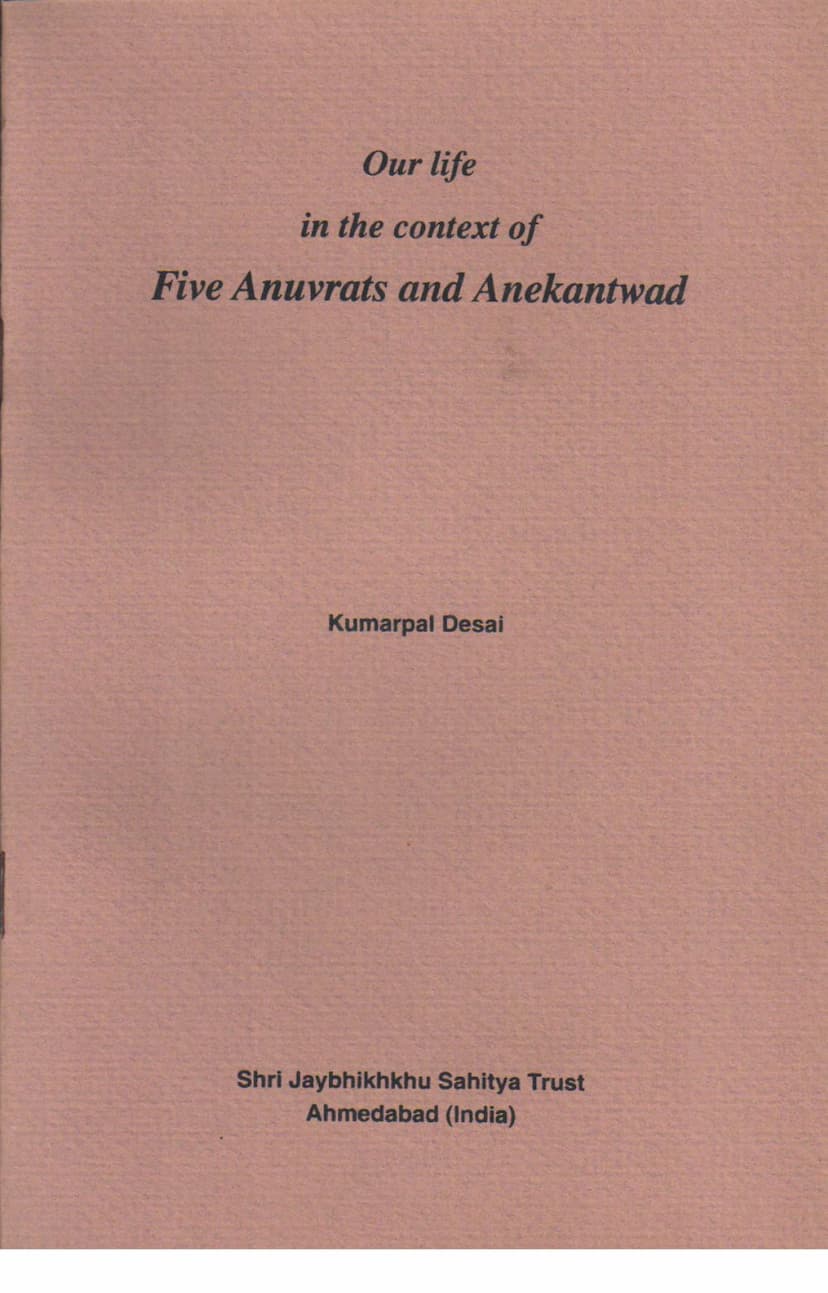Our Life In The Context Of Five Anuvrat And Anekantwad
Added to library: September 2, 2025

Summary
Here's a comprehensive summary of the provided Jain text, "Our Life In The Context of Five Anuvrat And Anekantwad" by Kumarpal Desai, based on the given pages:
The book, published by Shri Jaybhikhkhu Sahitya Trust, explores how Jain principles, specifically the Five Anuvratas (minor vows) and Anekantavada (the doctrine of manifold aspects), provide a framework for a meaningful and harmonious life. It highlights Jainism as one of the world's oldest living religions, where "Jina" signifies a spiritual victor who has overcome passions.
Core Tenets of Jainism:
- Purity of Consciousness: The essence of Jain religion lies in realizing the inherent purity of consciousness. The love of truth, when manifested through spiritual exercise, leads to liberation.
- Inseparability of Truth and Values: A Jain's conduct is intrinsically linked to their way of life, with Truth and Values being inseparable.
- The Five Vows (Anuvratas): These form the basis of Jain values and guide the lifestyle of both lay followers (Shravak) and ascetics (Sadhu). The foremost vow is:
- Ahimsa (Non-violence): This is the cornerstone of Jainism, integrated scientifically and thoroughly into its teachings and practices. It's not just human sympathy but deep empathy with all living beings and the universe. The text emphasizes that violence begins in thought and extends to speech and action. Bhagwan Mahavir's teachings highlight that harming others is ultimately harming oneself. Ahimsa is presented as a way of life that shapes humanity. The book connects Ahimsa to the doctrine of the equality of all souls, stating that everyone desires life and happiness. It criticizes contemporary violence at individual and global levels, including military spending and the pursuit of weapons. The text asserts that Ahimsa is not merely a precept but a way of life that gives shape to humanity.
- Satya (Truthfulness): Truth is considered God, and unwavering adherence to truth can lead to conquering death. The Jain approach to truth is not rigid; it acknowledges that others' perspectives may also hold truth, fostering equality, tolerance, and coexistence.
- Asteya (Non-stealing): This involves not taking anything that is not freely given, nor aiding others in doing so.
- Brahmacharya (Celibacy/Chastity): Bhagwan Mahavir added this vow, emphasizing that sensual pleasures are the root cause of worldly suffering and are ultimately harmful.
- Aparigraha (Non-possession/Non-attachment): Possession is seen as the source of evil, including violence, untruthfulness, stealing, and attachment. Uncontrolled desire for possession leads to misery and bondage. True welfare lies in causing minimal harm to others.
Anekantavada (Doctrine of Many-Sidedness):
- Understanding Multiple Perspectives: Anekantavada is presented as the philosophical basis for Ahimsa. It accommodates a multiplicity of viewpoints and perspectives, recognizing that truth can be viewed from different angles.
- Relativity of Truth: The approach is not to assert one's view as the sole ultimate truth, but to acknowledge that what others perceive may also contain an element of truth. This fosters tolerance, assimilation, and coexistence.
- Conflict Resolution: Anekantavada is crucial for resolving disputes and ideological conflicts by encouraging the accommodation of others' views rather than refuting them. The analogy of the seven blind men and the elephant illustrates this concept.
- Universal Application: The text suggests that adopting Anekantavada can reduce life's sorrows. It is considered Mahavir's significant contribution to the world, akin to Albert Einstein's theory of relativity but applied to everyday life.
Holistic and Inclusive Lifestyle:
- Integrity of Life: Jainism emphasizes the integrity and totality of life, viewing it holistically and promoting assimilation rather than division.
- Practical Application: The principles of Ahimsa should extend beyond the home into all aspects of life, fostering love and compassion for all beings, including animals and even poisonous snakes, as exemplified by Bhagwan Mahavir and Chandkaushik.
- Diet and Well-being: The Jain philosophy on diet is rooted in non-violence, recognizing the impact of food habits on the mind. Fasting and vegetarianism are highlighted for their physical and mental benefits, gaining recognition in modern health practices. The practice of eating before sunset, mentioned in ancient scriptures, is also noted.
- Spiritual Practices: Practices like "Pachhakhan" (for peace of mind), "Kausagga" (for meditation), "Pratikramana" (for introspection), and "Paryushan" (for inner purification) are presented as means to achieve vitality and well-being.
- Character over Circumstance: Jainism emphasizes character and actions over birth, color, or creed. One becomes a true spiritual practitioner through observance and inner realization, not just external rituals or labels.
- Ecological Consciousness: Jain monks' practices, such as not eating green vegetables on certain days, demonstrate a deep commitment to ecological balance.
- Social Harmony: The book advocates for uniting humanity, revitalizing moral principles, and promoting peace and harmony. Bhagwan Mahavir's proclamation of the entire human race being one is presented as an antidote to communalism, hatred, and terrorism.
Relevance for the Modern World:
The book concludes by asserting that Jainism's message has profound relevance in the modern era. By adhering to its principles, humanity can utilize scientific advancements for the greater good, create a world free from hunger and hate, and achieve global peace and bliss, thereby creating a "heaven on this earth." The text encourages the practical application of these ideals to foster a more compassionate and harmonious existence.